

Anna Wolfe
Alex Hurdle, who graduated from Caledonia High School this year, supports a change to the school’s Confederate nickname. She said she’s embarrassed to tell her peers from other schools she’s an alum of a school with what she believes is a racially-charged mascot. “Our mascot does not represent any of the good parts of Caledonia. I feel like it obscures what it really means to be a student here,” she told Mississippi Today.
Rooting for and rooting out the Confederate mascot in small town Mississippi
When a federal judge scrutinized Caledonia’s Confederate mascot eight years ago, he quoted William Faulkner in his opinion: “We need to talk, to tell, since oratory is our heritage.”
The town is talking now.
By Anna Wolfe | July 7, 2020
CALEDONIA, Miss. — Graduating senior Teri Shellman was one of few Black students at her school in the small, rural northeast Mississippi town of Caledonia. She arrived there in third grade after the U.S. Air Force stationed her father at the base in nearby Columbus.
Shellman and her classmates were the “Confederates” — the public school’s current nickname and the name of the Southern army that fought to preserve slavery in the 1860s.
She said she never learned that fact about the Confederacy in her history classes, at her school located on Confederate Drive, but she does remember when her parents refused to purchase the band’s T-shirt for her in middle school.
“It’s a deep-rooted issue that everyone has just kind of ignored,” Shellman said. “It’s like everybody knows but nobody wants to open that can of worms.”
Following protests against Confederate imagery across the country, a group of parents are now petitioning the Lowndes County School District to change the mascot. Caledonia — a town of about 1,400, where nearly nine in ten people are white — is home to the better-ranked schools parents have flocked to in recent decades as the quality of the majority-Black Columbus Municipal School District declined.
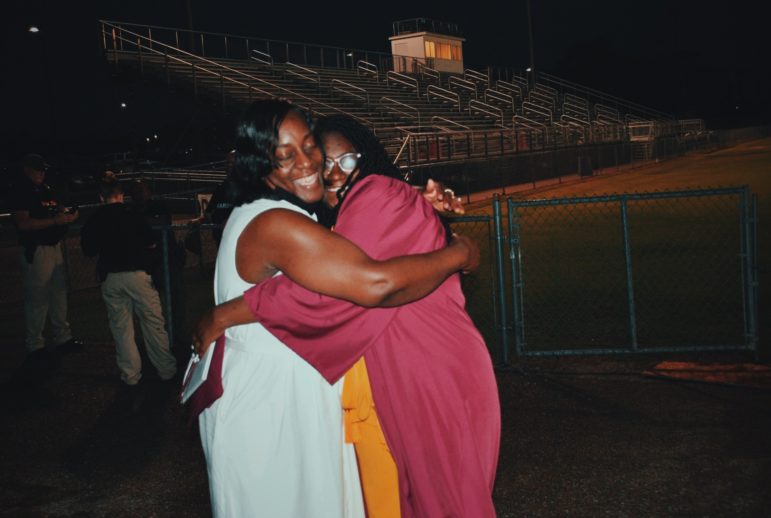
Courtesy Teri Shellman
Teri Shellman, a senior at Caledonia High School in northeast Mississippi, embraces her mom NaTarsha Shellman after their graduation ceremony on June 26, 2020. The high school held a limited attendance, socially distanced ceremony in the football stadium due to the ongoing COVID-19 pandemic.
Efforts to change the nickname, which began with conversations among the military families, have riled some locals, who made their opposition known through crass comments on a neighborhood Facebook page.
“Leave Caledonia alone,” one said. “If you don’t like the ‘Feds’ don’t move there.”
Though they have the option between the county or city school systems, virtually all parents who live on base enroll their kids in Caledonia, the only schools that send a bus there now. Even more families who move to the area for work are choosing to locate in the county district for the schools, which receives A or B grades from the Mississippi Department of Education, in contrast to many Ds and Fs among the elementary and middle schools in Columbus.
The Caledonia mascot, a nod to a proposed government founded on the principle that Black people are inferior to white, became an issue about a decade ago when the district sought to finally escape a federal consent order over unequal education that had carried on since integration.
But without vocal outcry over the nickname at the time, it has remained.
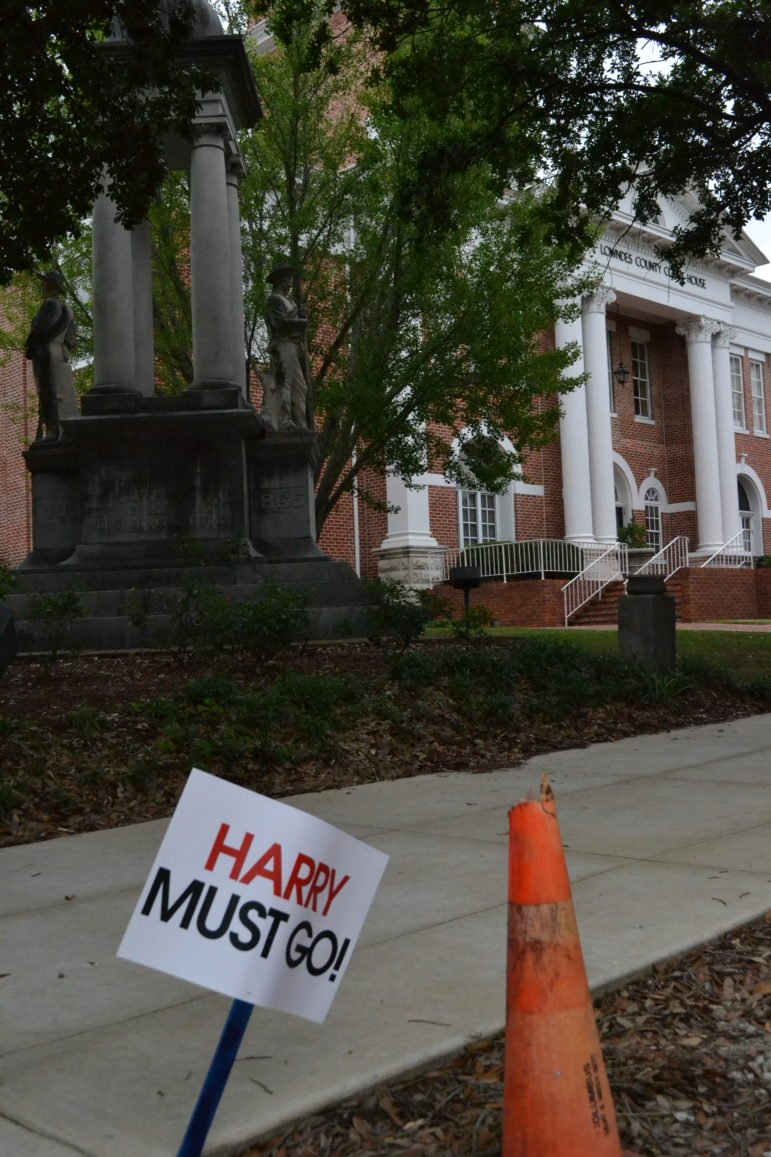
“It’s frankly … a backwards way of, in my opinion, trying to segregate the school,” said Makade Archibald, a white Caledonia resident, father of three and steel mill engineer. “By making people of color uncomfortable with the mascot, you’re discouraging them from joining the school.”
Caledonia is also represented by Lowndes County Supervisor Harry Sanders, who made national headlines in June when he remarked that Black people in America are the only group “having problems” because, he said, they had become dependent during the 250 years white people violently forced them into slavery. He made the inflammatory comments after the board voted against relocating the Confederate monument in front of the Lowndes courthouse on June 15. The board later voted on July 6 in favor of moving the statue.
Shellman told Mississippi Today that while growing up in Caledonia, a quiet town where residents generally get along, she never felt people treated her differently because of her skin color.
“I never noticed it because I didn’t want to, I guess,” Shellman said, though she did recall a few years ago when a student called her younger brother the n-word on the school bus.
Shellman said it wasn’t until the police killing of George Floyd in Minneapolis in late May, and the national conversation surrounding race that ensued, that she learned how divided her town really is.
“Recently, I’ve felt like I was kind of like blindsided by everything that’s going on,” she said, especially after sharing her thoughts on current events and using the “Black Lives Matter” expression on social media. “I thought everybody thought Black lives mattered. I didn’t realize that people actually thought there was an opposing statement to that.”
“My parents have always told me that I think everybody in the world is so nice … I have to be a little bit more mature about the way I look at everybody now,” she added.
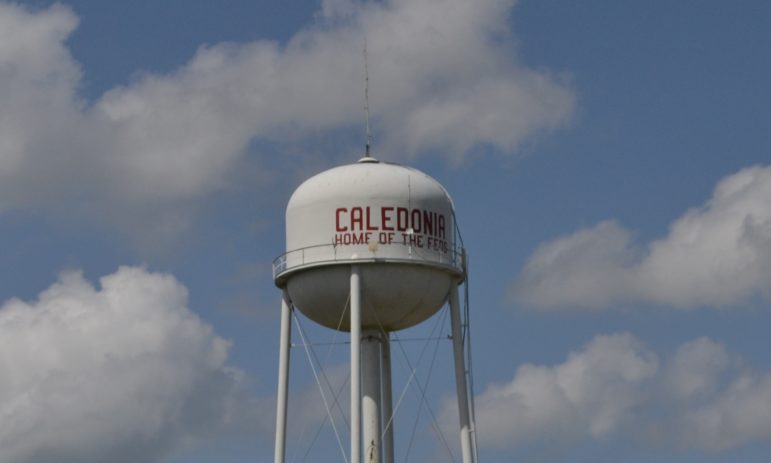
Anna Wolfe
Caledonia, a small town in rural northeast Mississippi, is “Home of the Feds,” short for the “Confederates” — the nickname for the school’s sports teams and the army that fought on behalf of Southern states in the 1860s with the goal of preserving the institution of slavery.
Stay-at-home mom of two Amanda Nielson, who is white, said she loves the feel of older homes. So when the Air Force stationed her husband in Columbus three years ago, she began looking at houses in the city, which were, as an added bonus, lower priced than property out in the county.
Ultimately though, “we could not handle the difference in the school quality, so we sucked it up and we moved out here,” Nielson said.
She initially bought T-shirts that read “Feds” to support her 8-year-old son, who is on a recreational football team. But she quickly became uneasy about where she and her husband would wear the shirts and what message they may be sending. “And you should never feel uneasy about something like that,” Nielson said.
After Floyd died, Nielson felt compelled to better educate herself about systemic racism. She wasn’t sure how she would go about fixing inequities in large, stubborn systems — such as segregated and unequal public education — but “I can think of this one thing at my school that does seem unfair to a group of people,” she said, referencing the Confederate nickname at the local schools.
“So just from my own sphere of influence, maybe that’s something that I could address,” she added.
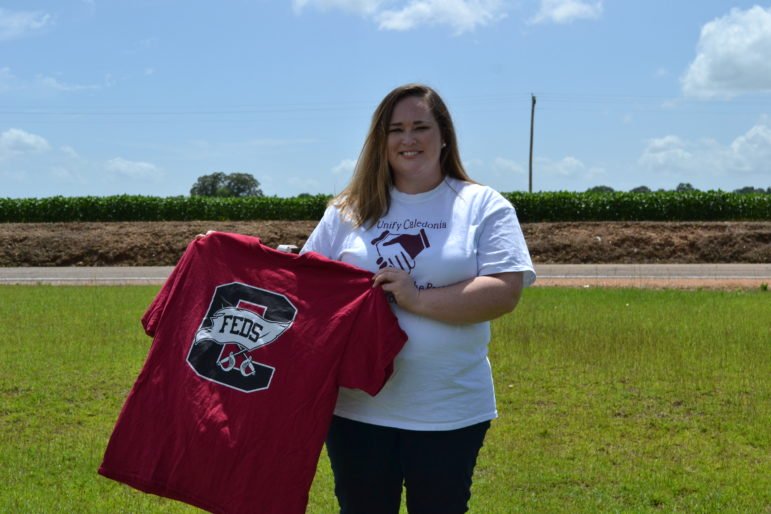
She wrote a post in a Facebook page for military members, thinking she would slowly gauge the feelings of her community on the mascot, but opponents of the change picked up and shared her post on a larger platform, prompting a firestorm of messages. “This all started when some knot headed air force mom stuck her nose in some business it DID NOT belong in,” one commented.
Others defend the nickname, suggesting to change it would be to “destroy our school history.”
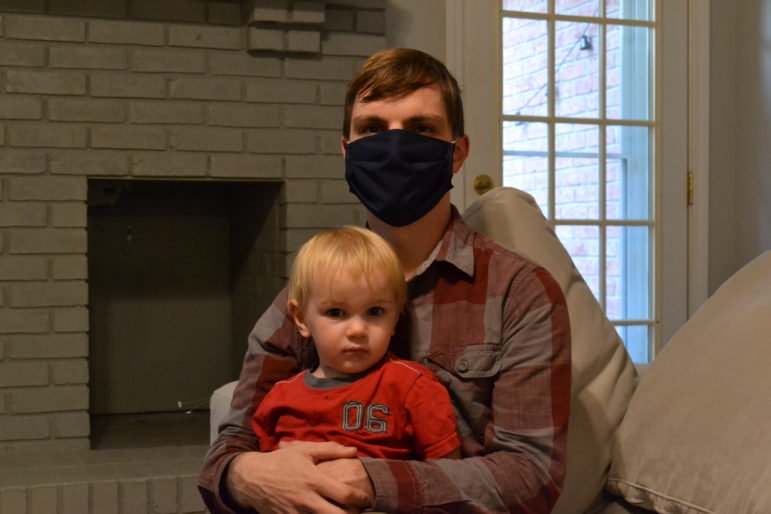
Anna Wolfe
Makade Archibald, an engineer at the local steel mill, and his wife moved to Columbus three years ago and chose a house that would put their three boys in the Caledonia schools district. Since speaking out in favor of changing the school’s nickname from the “Confederates”, Archibald said he’s been confused by the resistance to getting rid of the clearly offensive name.
“You’ve got to give me a logical reason. And all I hear is like, ‘Blah, blah, blah, history,’” Archibald said of these arguments. “Do we really preserve history with high school mascots? Is that how history preservation is done? I just don’t get it. Where are the Caledonia Dwight D. Eisenhower’s?”
Mississippi Today reached out to a dozen people who voiced opposition to the name change on Facebook but almost none of them responded or agreed to an interview. One former student, Rita Flippo Boykin, said she didn’t oppose the name change, but wishes the students could offer some input. Jimmy Brewer, a Caledonia parent, felt the same way, adding, “the ones that want it changed should be willing to pay the bill for it all.”
The Lowndes County School Board has agreed to consider changing the name and will include a survey about the mascot in the enrollment packets it sends to parents at the start of the school year, Superintendent Sam Allison said.
Once Nielson explained in simple terms to her son and 6-year-old daughter the purpose of her campaign to change the nickname, “they instantly thought of their friends, who are Black, and were really sad for them.”
The girl, a cheerleader named Lottie, became solemn and asked her mom if she should stop saying “Go Feds!” in her team’s routine.
“I wish that more people would feel that way, not for the politics of it … but just on a personal level, if we would have conversations with our friends and our neighbors and just genuinely say, ‘How do you feel about it?’ And then be open to listening about their personal experience,” Nielson said. “I think that’s where that change of heart comes from.”
Thomas McAfee, whose wife was stationed at Columbus last year, said they were already apprehensive about moving to Mississippi because of its reputation, but were excited about the quality of the schools in Caledonia.
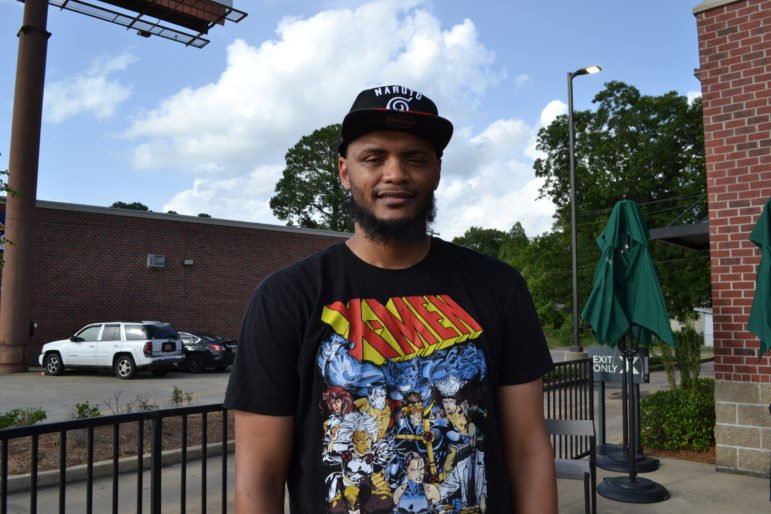
Anna Wolfe
Thomas McAfee, his wife and two children moved to the Columbus Air Force Base last year and chose Caledonia schools because of their high academic scores. But when they realized their children would be referred to as the “Feds,” short for “Confederates” — the school nickname — they had second thoughts.
“It wasn’t until after we actually got them enrolled that we realized their mascot was the Confederates,” Taylor, who is Black, said. “We were considering moving them over to the Columbus school system.”
One mom, who is also Black and attended Columbus schools herself, also struggled to decide where to send her daughter, who’s now in middle school, before enrolling her at Caledonia.
“It was a really tough decision, you know? What do you do? You deal with the mascot, put her in the school that’s rating or grading higher? Or do you send her to where she would probably be more comfortable but not have as many opportunities?” said the mom, who did not want her name printed for fear of retaliation against her daughter at school.
Her son also went to Caledonia and played on the basketball team before he graduated. She said she felt they were the butt of a joke as she strategically cropped out the gigantic “Caledonia Confederates” lettering on the gym walls in her photos of him on the court.
Another Air Force parent who did not want to be named and no longer lives in the state told Mississippi Today he enrolled his Black 14-year-old son in Columbus High School, against the advice of all the advisors on base, purely because of the nickname at Caledonia. He was not happy with the quality of the education and eventually sent his son to live in Colorado with his grandparents during his second year stationed in Columbus.
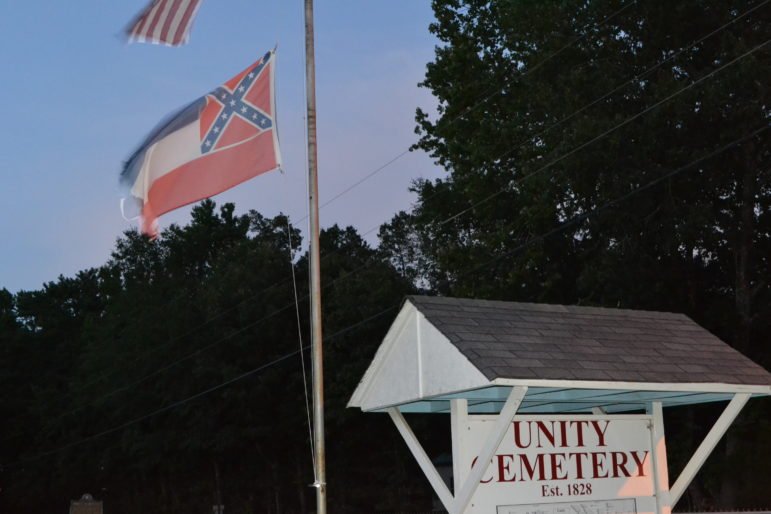
Anna Wolfe
Graves in Caledonia’s Unity Cemetery are segregated by race, with the few marked graves for Black residents located closest to Wolfe Road and the white graves, many topped with Confederate battle flags and American flags, further back. Soldiers who fought in the Civil War and Revolutionary War are buried in Unity Cemetery. During a Facebook debate over changing the Caledonia schools’ nickname from the Confederates, one commenter wrote, “Maybe these people that are not from Caledonia need to study up on their history. Or better yet… take a walk through Unity Cemetery. Do some research about the town. We don’t go to their hometowns and try to change what we don’t like there.”
By 2012, Lowndes County School District was still under a federal consent degree dating back to the 1970 court order that permanently prohibited many school districts across the state from discriminating or offering unequal education to their students based on their race.
When the district asked the court that year to grant them unitary status, certifying that they had indeed rectified the lingering effects of past segregation, the judge had one primary reservation: the Confederate nickname at Caledonia.
“Simply stated, the court can discern no good reason why a Mississippi public school would wish to associate itself with any divisive nickname or symbol,” U.S. District Judge Michael Mills wrote in his order.
Mike Halford, a former superintendent who spoke on behalf of the district at the hearing, “appeared to recognize that such a nickname can hinder the school’s mission of educating students of all races,” Justice Mills wrote.
But Halford argued the district had distanced itself from the Confederates nickname — using the shortened “Feds” for chants and on some sports jerseys.
He also sought points with the judge by emphasizing “how the school did not replace the painting of a Confederate soldier on the wall in Caledonia High School’s gymnasium after it was destroyed in a tornado,” in 2009, the opinion reads. But students had painted “Caledonia Confederates” in big red and white letters on the walls inside the current building, longtime teacher Christi Carter told Mississippi Today.
The judge also examined the use of the “n-word” among students in the district, for which there had been 26 complaints 2010-2012 — which Halford called a small number.
Ultimately, the judge granted the district unitary status, dismissing the original case in large part because no one from the community actually spoke out against the Confederate mascot.
“You pick your battles,” the mom from Columbus told Mississippi Today as she recalled the younger years of her son, who has since graduated from Caledonia.
She never tried to fight the Confederate nickname, explaining: “Going through a divorce, having to start over, raising a son. It’s hard enough just … keeping him on the right track and having people not see him as a threat. I just had my hands full and that just was a beast I was not equipped to take on at the time.”
“I never liked it,” she said.
In his order, Mills acknowledged there were “strong feelings” on both sides of the debate and that officials had taken the “political path of least resistance” by choosing not to act.
“On the one hand, some will say ‘we mean no harm, we are only honoring our heritage.’ On the other hand, another will say ‘this is a heritage which demeans me.’ The best minds of the South have long known that those with competing interpretations of the past need to find a way to overcome the past.”
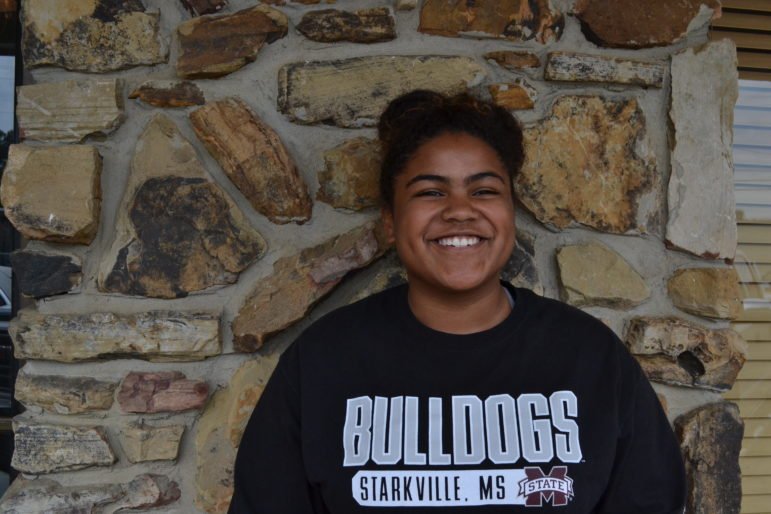
Anna Wolfe
Sonniah Ramirez, a 12-year-old student at Caledonia Middle School, has participated in recent demonstrations to remove symbols of the Confederacy from her community, such as the statue outside the Lowndes County Courthouse and the nickname at her school. She said she wants to see the monuments to the Confederacy removed because “they wanted to me to stay a slave. They wanted my people and people of color to stay in slavery. That’s basically what they did and basically what they fought for.”
Eight years later, the name of the South’s failed alliance still appears on the gym walls and in a half circle around first plate on the baseball field — a new addition in the last few years, Allison said.
It also lives on through merchandise designed by the local booster club and the Dollar General in town still sells shirts with “Caledonia Confederates” emblazoned across the front, Shellman said.
And student are still subjected to racist slurs.
“They’re basically allowing us, Black people, to come to a school that represents keeping slavery around. There’s a lot of racists in that school,” said 12-year-old Caledonia middle schooler Sonniah Ramirez, who is Black and Hispanic. “Me and my friends, we have been called a n*****.”
Ramirez said the student who called her the racial slur this past school year was only disciplined with a write-up. “Nothing happened,” she said. “You could tell they (administrators) didn’t care.”

Anna Wolfe
Seniors at Caledonia High School can reserve their own parking spot for the year and paint it with the design of their choice. From left to right: the Mississippi State flag and American flag; a painting of the Earth and message, “Be the change”; the school logo, which is an image of two swords crossed and flag reading “Feds”.
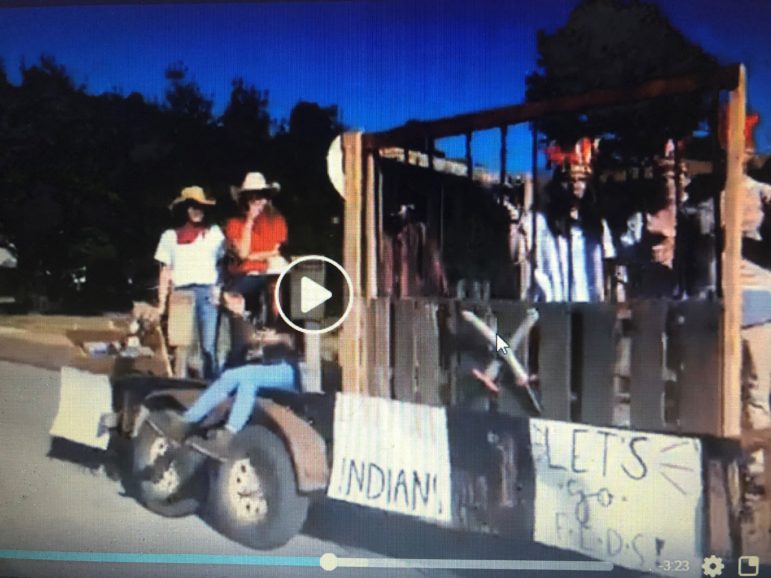
Use of the n-word is not the only example of racist microaggressions perceived by parents and students who spoke to Mississippi Today: During the high school’s 2019 Homecoming parade, students on one float stood in a mock prison cell, dressed in costumes with feather headpieces. Their sign read “Imprison the Indians,” referring to their opponent in football that week, the Itawamba Agriculture High School Indians. Students told Mississippi Today that faculty voted it best float in the annual contest.
Alex Hurdle, a graduating senior, recalled that the school suspended her Black classmate after using a curse word, though other white students frequently curse with much less severe, if any, repercussions.
Allison, the superintendent, said he had not encountered any of these issues since taking the position in January and that any kind of racial harassment is “a huge infraction across the district,” and incidents are “treated as serious as they are.”
Shellman, the recent Caledonia graduate, said she believes some of her peers who reject “Black Lives Matter” or who’ve said they prefer to keep the Confederate mascot “are falling behind what they hear their parents say.”
“And I feel like they’re doing that because we weren’t taught in-depth about the Confederacy, so they don’t have enough information to actually form their own opinion.”
In middle school, Shellman’s teachers taught her the South fought the Civil War over states’ rights. They taught separately that slavery ended after the war, Shellman said, as if they expected students to connect the dots themselves.
Shellman said she also believes her school shied away from the Confederacy’s history because of the iconography at the school, which subconsciously hinders them from addressing those hard truths.
“I’ve been reminding myself that I can’t be angry at people for things they don’t understand,” Shellman said. “I think a lot of people, they’re not fully educated on what’s actually happening and they’re just acting on feeling right now. They just feel like the world is against them and it’s more like the world is finally being unveiled for what it actually is.”
The post Rooting for and rooting out the Confederate mascot in small town Mississippi appeared first on Mississippi Today.
- Ole Miss QB Trinidad Chambliss’ NCAA appeal is denied, but legal fight over eligibility continues - February 5, 2026
- Visitor brochures are returned to Medgar Evers home - February 5, 2026
- Advocates demand fix for Mississippi’s child care crisis - February 5, 2026